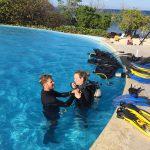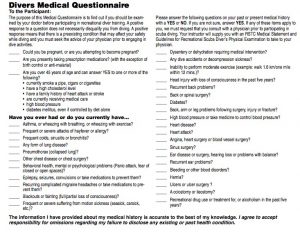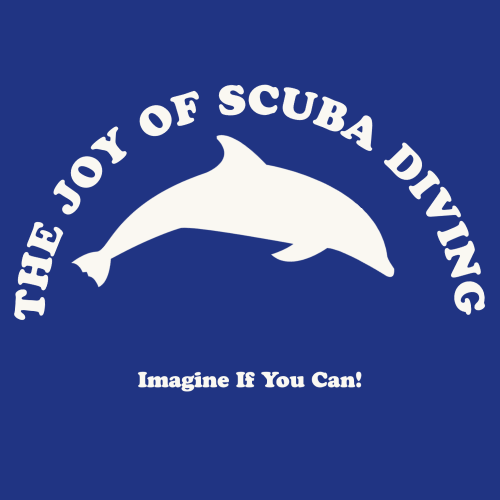So you want to learn how to scuba dive. I have the best scuba diving tips for beginners!
There are 9 pieces of important information!
This article is written for anyone interested in wanting to take their  first scuba diver certification course or a quick introductory course to scuba diving (no certificate).
first scuba diver certification course or a quick introductory course to scuba diving (no certificate).
If you’re going to do this, you want to do it the right way. Safety is everything!
This is why I want to share this information to you!
Things you need to know before taking your first dive course:
1.Health.
Conditions like:
- Asthma (mild, intermittent, controllable to severe)
- Diabetes
- Heart disease
- Cancer
- Pneumothorax (lungs)
- DCS (Decompression Sickness)
- Pregnancy
My advice is to consult with your family doctor first. Before you can learn to scuba dive at a dive shop or resort, you will be given a medical questionnaire to fill out. The form will have a list of medical conditions and any check marks you place will require you to get medical authorization relevant to scuba diving in writing from your family physician.

Caution: I have known certified divers who have falsified their information on the medical form because they wanted to scuba dive desperately. Please don’t this! I’ve seen divers panic because they couldn’t breathe through their breathing apparatus due to the trigger of asthma. This not only puts the asthmatic diver in danger but can also places risk on the diver who is doing the rescue.
What if you have a cold, a toothache, stomach flu?
You’re not feeling up to snuff… your nose is runny, your head feels stuffed up… it’s not safe to dive when you have the flu. Chances are, if you’re feeling like this, you’re not even going to be able to equalize your ears underwater and therefore feel pain in your ears. There are various methods you can relieve the pressure on your ears but it can be more difficult when your sinuses are not clear.
Got a toothache before you dive? You’re better off to get that tooth decay or any dental infections looked after by a dentist before you scuba dive otherwise you might experience the discomfort of tooth squeeze.
For those of you who feel like you have stomach flu, I suggest not diving until you feel better.
Are you prone to motion, boat movement – sea sickness?
I have the perfect solution for those of you who feel seasick – I take chewable Ginger Gravol. It’s the best in  my opinion and is non-drowsy. I’ve tried the basic Gravol and other seasickness preventatives but they make you tired and after your dive, you just want to sleep the rest of the day off.
my opinion and is non-drowsy. I’ve tried the basic Gravol and other seasickness preventatives but they make you tired and after your dive, you just want to sleep the rest of the day off.
Take the Ginger Gravol at least 30 minutes before you get on the dive boat… works like a charm!
2. Know the prerequisites.
a) Do your research online for a scuba diver organization (i.e. PADI, SSI, SDI – members of WRSTC) or contact the dive shop or resort you want to take your course from.
b) Age is a factor. In PADI’s case, for example, they will tell you, in most areas, the minimum age is 10 years old.
c) If you’re considering PADI’s Discover Scuba Diving Course, the minimum age is also 10 years of age but for this, you will not receive a certification.
d) Be aware that you will need to sign a medical questionnaire that I spoke of earlier.
3. What kind of swimmer should you be?
a) You should feel comfortable in water and be able to put your face directly in the water.
b) Some basic swimming skills are necessary, for instance, you should be able to float and tread water for 10 minutes. The best part is, you can do this anyway you want.
c) You must be able to swim 200 metres/yards any style you want or if you don’t want to do that then you must swim 300 metres/yards wearing mask, snorkel and fin. Both require not stopping.
d) If you have physical challenges, you can still earn your scuba diver certification thru adaptive methods and techniques that will enable you to achieve the requirements. The best thing to do is to consult with the dive shop and the scuba diver organization like PADI. SSI or SDI.
4. Know and control your fears.
a) If you’re afraid of sharks for example, do some research. I think you will realize sharks mean no harm.
b) If you’re afraid of the water, go to the pool and become a stronger swimmer and gain confidence.
c) If you’re afraid of being left alone or abandoned, choose a dive buddy you can trust and do your research on the dive shop or resort’s reputation. Choose a dive shop affiliated with WRSTC.
5. Give yourself time to learn.
a) If you don’t want to spend your time at a resort or dive shop studying from a manual, PADI, SSI, and SDI offer e-Learning for your certification course. You can do this at home and then get a referral and then take that trip to do your 4 open water dives thru a dive shop or resort. The time it takes to get your certification is totally up to you and your dive shop you connect with.
6. Choose your dive location where you want to learn.
I’ve always had the belief that your first dive is THE most important for someone who is just learning! If you have a bad experience, say the water was rough and visibility was poor and you got seasick, boat ride to dive site took 45 minutes… it simply was not fun.
Ummm, would you consider going diving again even after earning your certification? So easy to get discouraged…
Location is important because you want your first dive to be the best scuba dive experience ever! Exciting news to tell your friends and family when you get home.
In order to get your Open Water Scuba Diver Certification from PADI for example, you must do 4 open water dives. This means for beginners you are diving 60 feet/18 metres. Some things you would want to check out are:
a) Water temperature
b) Seasonal weather conditions – best time to travel
c) Type of diving – drift diving?
d) What ocean?
e) What do you want to see underwater?
7. Choose your dive shop or resort wisely!
a) The dive shop or resort should be affiliated with WRSTC. Check the reviews. Trip Advisors have lots of information to share.
b) It would be nice if the dive shop or resort have a pool where they teach you the scuba dive skills like familiarity with dive gear. Some dive shops don’t have pools which is fine too because they will do the training in shallow water.
c) Can also get a list of dive shops thru PADI, SSI and SDI. They are well known scuba diver training organizations who are members of WRSTC.
d) What kind of dive boats do they have? If you have physical challenges, you would want to know if they are properly trained and have methods to train and assist you both in the water and back onto the dive boat.
e) Do they pick you up and bring you back to where you’re staying? Do you have to walk or take a cab to get there? Are they located at a resort?
8. What’s involved in the beginner course?
Get an idea of what your beginner certified course is all about. Classroom, 4 open water dives, confined water, referral, etc. Of course, you want to know the cost too.
9. Purchase your own equipment?
a) It’s up to you, but you don’t need to purchase any dive gear immediately. All your dive gear rentals are included in the courses.
b) Once you have taken the course and you decide you enjoy scuba diving, which I’m sure you will…. after a few more dives and renting dive gear, you will then be in a much better position to decide or have some ideas of what kind and brand of dive equipment you want to invest in.
Moving forward!
Now that I’ve given you a lot of things to think about and prepare, I hope you found the information helpful! Getting your first scuba dive is exciting and I’m sure you will feel very proud to be a certified scuba diver. You’ve only just begun into exploring the underwater world! There are many more exciting courses to take.
If you’ve decided not to do that yet and just go for the short introduction course, that’s wonderful too. You will enjoy that just as much and before you know it, you’ll long to get certified!
I’ve mention PADI, SSI and SDI several times here and if you’re interested in learning more about them, please click here! The information will help you decide which scuba diver training organization to choose.
If you have any questions or comments, please put them below in the comment box. I hope you enjoyed reading this!!

I’ve always wanted to go scuba diving and found this site to be perfect for me to learn more on how to start. I used to be on a swim team so I don’t think the swimmer prerequisites should be an issue.
I do get motion sickness from time to time so I’m glad to see you’ve added ginger gravol to help counteract those affects. I never even considered motion sickness for a possible scuba diving trip. What are some of your favorite spots or locations to go scuba diving and should it only be done in warm water? Thanks!
Hi Peter,
Thank you for reading my article! Nice… well then, you will have no issues of getting certified. It will be really easy for you!
I’m very prone to feeling seasick and Ginger Gravol comes to the rescue every time. If I already feel the motion on the boat… the rocking… I’m pretty much toast because even when I’m underwater, that queeziness just sticks….It’s a terrible feeling to have when you’re scuba diving…
My favorite location is Grand Turk, Turks and Caicos Islands. Beaches and the ocean is very clean. Nice easy diving. I especially enjoy the dive shops services because they come over and pick you up in their small dive boats. Visibility underwater is excellent (except on very windy days of course). I like to dive in warm water…
You can scuba dive in cold water but I’m afraid I’m not that tough… would have to wear drysuit.
Another great place is Cozumel… drift diving there and quite easy and lots of fun too!
Please let me know when you get certified and let me know if you have any other questions.
Regards,
Monica
Hi there. I’ve always loved swimming and the sea and would love to dive in future. I’ve never really dive before so I want to know how hard is it to dive? I’m quite capable of swimming and floating in water but never really tried to dive (even in pool)…
Can you share the rate for these dive schools? I think cost-wise, it’s better for me to learn how to dive before going to get certified right?
Hi Isaac,
Thank you for reading my article! Scuba diving is not difficult at all because in the water, you’re weightless. It’s important to feel comfortable in water and because you enjoy swimming and spending time in the sea.. I can see you will absolutely love the sport. Resorts usually have a pool where you get hands on familiarity with your dive gear and techniques. I recommend going with PADI’s Open Water Scuba Diver Course (certificate) which is around 460.00 or PADI’s Discover Scuba (no certificate) is around 100.00. These include dive gear rentals.
Yes, much better to get certification. Certification is good ‘forever’ and saves you the disappointment of being turned away for tank fills, and dive gear rentals. Your investment is well worth it!
Let me know when you do it!
Regards,
Monica
Hey there! I found your article very helpful. I like to try scuba diving but I don’t know the process of it. After I read your article you gave me an idea about scuba diving and how to be certified. Scuba diving is one of my life wishlist that I want to try. Thank you for sharing this information.
Hey John, thank you for your comment!
You can even do this at your local dive shop. Thanks to computer technology, we can learn at our own pace, forget the books and start online to work towards certification or do the introduction to scuba diving which can be done immediately with a dive shop or resort. Have fun!
I like that you mention giving yourself time to adjust and learn. My brother is looking to get his scuba diving certification but needs tips. I’ll be sure to talk to him about giving himself time to really get it down.
Hi Kyle,
Thank you for your great comment and I’m really happy to hear you will be talking to your brother on the tips discussed in this article.
Being patient and taking the time to adjust and learn… making sure to understand and asking lots of questions will help him to feel comfortable during the course. Please tell him to have lots of fun learning and to just go with the flow. I would love to hear what he experienced…
Kind Regards,
Monica
Hi Monica
Great site with lots of really informative material.
My friend here in New Zealand got his diving certificate at 15 and now works for conservation around the world. I’m thinking about it now too so I really found this very helpful to get me started.
Hi Vicki,
I’m very happy to know my article was very helpful to you. I hope you are now on the way to getting started on this exciting adventure so you can dive with your friend.
Have fun… I would love to hear how your entry-level course went too.
Thanks for reading.
Monica